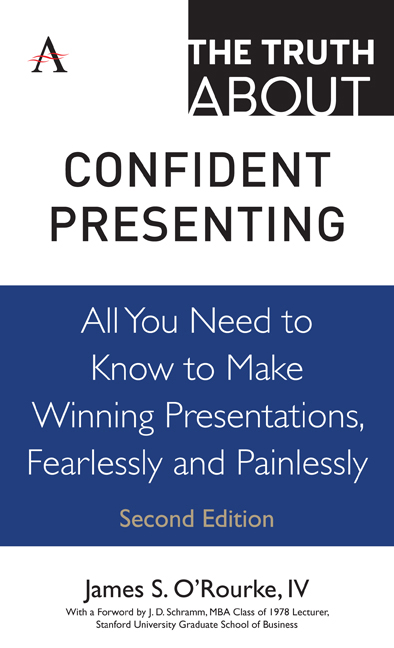 The Truth about Confident Presenting
The Truth about Confident Presenting Book contents
- Frontmatter
- Contents
- Foreword
- Introduction
- Part I Some Initial Truths
- Part II The Truth About Getting Ready to Speak
- Part III The Truth About What Makes People Listen
- Part IV The Truth About Developing Support for Your Presentation
- Part V The Truth About Getting Up to Speak
- Truth 25 Select a delivery approach
- Truth 26 Your introduction forms their first impression
- Truth 27 Begin with a purpose in mind
- Truth 28 Keep your audience interested
- Truth 29 Conclusions are as important as introductions
- Truth 30 Have confidence in your preparation
- Truth 31 Repeat the process as often as possible
- Part VI The Truth About Managing Anxiety
- Part VII The Truth About Nonverbal Communication
- Part VIII The Truth About Visual Aids
- Part IX The Truth About Handling an Audience
- Part X The Truth About What Makes a Presentation Work
- References
- Acknowledgments
- About the Author
Truth 30 - Have confidence in your preparation
from Part V - The Truth About Getting Up to Speak
- Frontmatter
- Contents
- Foreword
- Introduction
- Part I Some Initial Truths
- Part II The Truth About Getting Ready to Speak
- Part III The Truth About What Makes People Listen
- Part IV The Truth About Developing Support for Your Presentation
- Part V The Truth About Getting Up to Speak
- Truth 25 Select a delivery approach
- Truth 26 Your introduction forms their first impression
- Truth 27 Begin with a purpose in mind
- Truth 28 Keep your audience interested
- Truth 29 Conclusions are as important as introductions
- Truth 30 Have confidence in your preparation
- Truth 31 Repeat the process as often as possible
- Part VI The Truth About Managing Anxiety
- Part VII The Truth About Nonverbal Communication
- Part VIII The Truth About Visual Aids
- Part IX The Truth About Handling an Audience
- Part X The Truth About What Makes a Presentation Work
- References
- Acknowledgments
- About the Author
Summary
Everyone gets nervous in advance of a presentation. Yes, even seasoned professionals with years of experience in public speaking say that they get just a bit nervous beforehand. But anxiety is a natural, normal response that you can learn to manage. I talk at greater length about managing anxiety and stage fright in Truths 32– 35, but for now, focus on this principle: you'll perform better if you have confidence in your preparation.
If you thoroughly researched your topic, organized your material in a way that will make sense to the audience and rehearsed your presentation carefully, you'll be fine. You simply need to trust the work you've done in preparation for the moment when you take the stage. You'll be nervous when you step up to the microphone, even the pros say that. But if you have confidence in the work you've done in advance of that moment, you'll do well.
A lesson from behavioral psychology might be helpful here. A scientific principle developed by Robert M. Yerkes and J. D. Dodson, known as The Yerkes-Dodson Law, demonstrates a clear relationship between arousal and performance. Their principle implies that, to a certain point, a specific level of stress is healthy, useful and even beneficial. This usefulness can inspire you to not only perform well in presenting, but also can improve your health and general well-being.
The stimulus of the human stress response is often essential for success. You see this commonly in situations such as sporting events, academic pursuits and even in many creative and social activities. As stress levels increase, so does performance. This relationship between increased stress and increased performance does not continue indefinitely, however. Think of the relationship as a bell-shaped curve.
As stress increases, your performance increases until you reach the 30 top of the curve. Then it actually drops and continues dropping until it finally flattens out when it reaches conditions of intolerable stress. When stress exceeds your ability to cope, this overload contributes to diminished performance, inefficiency and even adverse health problems. Ironically, as you move from the “ten o'clock” to the “two o'clock” position on the curve, your stress doubles and you've cut your productivity in half!
For peak performance, you want to stay near the top, just to the left-hand side of the apex of the curve.
- Type
- Chapter
- Information
- The Truth about Confident PresentingAll You Need To Know To Make Winning Presentations, Fearlessly And Painlessly, pp. 119 - 122Publisher: Anthem PressPrint publication year: 2019


